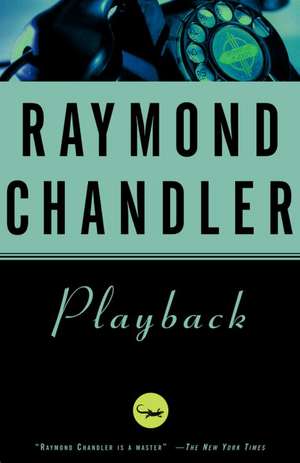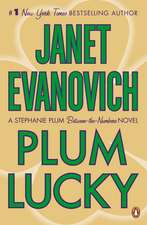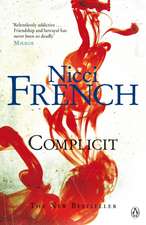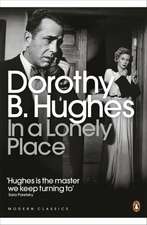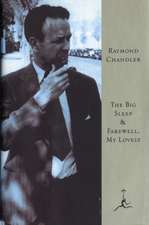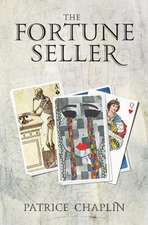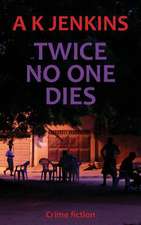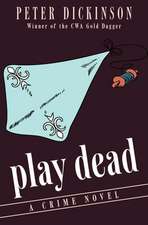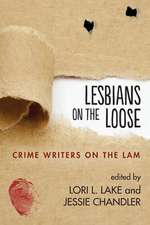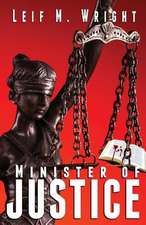Playback
Autor Raymond Chandleren Limba Engleză Paperback – 31 iul 1988
"Chandler wrote like a slumming angel and invested the sun-blinded streets of Los Angeles with a romantic presence:" -- Ross Macdonald
| Toate formatele și edițiile | Preț | Express |
|---|---|---|
| Paperback (2) | 62.79 lei 3-5 săpt. | +6.46 lei 4-10 zile |
| Penguin Books – 30 mar 2011 | 62.79 lei 3-5 săpt. | +6.46 lei 4-10 zile |
| Vintage Books USA – 31 iul 1988 | 97.46 lei 17-23 zile | +8.44 lei 4-10 zile |
Preț: 97.46 lei
Nou
Puncte Express: 146
Preț estimativ în valută:
18.65€ • 19.27$ • 15.52£
18.65€ • 19.27$ • 15.52£
Carte disponibilă
Livrare economică 28 februarie-06 martie
Livrare express 15-21 februarie pentru 18.43 lei
Preluare comenzi: 021 569.72.76
Specificații
ISBN-13: 9780394757667
ISBN-10: 0394757661
Pagini: 166
Dimensiuni: 132 x 203 x 13 mm
Greutate: 0.16 kg
Editura: Vintage Books USA
Colecția Vintage Books
ISBN-10: 0394757661
Pagini: 166
Dimensiuni: 132 x 203 x 13 mm
Greutate: 0.16 kg
Editura: Vintage Books USA
Colecția Vintage Books
Notă biografică
Raymond Thornton Chandler (1888 - 1959) was the master practitioner of American hard-boiled crime fiction. Although he was born in Chicago, Chandler spent most of his boyhood and youth in England where he attended Dulwich College and later worked as a freelance journalist for The Westminster Gazette and The Spectator. During World War I, Chandler served in France with the First Division of the Canadian Expeditionary Force, transferring later to the Royal Flying Corps (R. A. F.). In 1919 he returned to the United States, settling in California, where he eventually became director of a number of independent oil companies. The Depression put an end to his career, and in 1933, at the age of forty-five, he turned to writing fiction, publishing his first stories in Black Mask. Chandler’s detective stories often starred the brash but honorable Philip Marlowe (introduced in 1939 in his first novel, The Big Sleep) and were noted for their literate presentation and dead-on critical eye. Never a prolific writer, Chandler published only one collection of stories and seven novels in his lifetime. Some of Chandler’s novels, like The Big Sleep, were made into classic movies which helped define the film noir style. In the last year of his life he was elected president of the Mystery Writers of America. He died in La Jolla, California on March 26, 1959.
Extras
ONE
The voice on the telephone seemed to be sharp and peremptory, but I didn't hear too well what it said--partly because I was only half awake and partly because I was holding the receiver upside down. I fumbled it around and grunted.
"Did you hear me? I said I was Clyde Umney, the lawyer."
"Clyde Umney, the lawyer. I thought we had several of them."
"You're Marlowe, aren't you?"
"Yeah. I guess so." I looked at my wrist watch. It was 6:30 a.m., not my best hour.
"Don't get fresh with me, young man."
"Sorry, Mr. Umney. But I'm not a young man. I'm old, tired and full of no coffee. What can I do for you, sir?"
"I want you to meet the Super Chief at eight o'clock, identify a girl among the passengers, follow her until she checks in somewhere, and then report to me. Is that clear?"
"No."
"Why not?" he snapped.
"I don't know enough to be sure I could accept the case."
"I'm Clyde Um--"
"Don't," I interrupted. "I might get hysterical. Just tell me the basic facts. Perhaps another investigator would suit you better. I never was an FBI man."
"Oh. My secretary, Miss Vermilyea, will be at your office in half an hour. She will have the necessary information for you. She is very efficient. I hope you are."
"I'm more efficient when I've had breakfast. Have her come here, would you?"
"Where is here?"
I gave him the address of my place on Yucca Avenue, and told him how she would find it.
"Very well," he said grudgingly, "but I want one thing very clear. The girl is not to know she is being followed. This is very important. I am acting for a very influential firm of Washington attorneys. Miss Vermilyea will advance you some expense money and pay you a retainer of two hundred and fifty dollars. I expect a high degree of efficiency. And let's not waste time talking."
"I'll do the best I can, Mr. Umney."
He hung up. I struggled out of bed, showered, shaved and was nuzzling my third cup of coffee when the door bell rang.
"I'm Miss Vermilyea, Mr. Umney's secretary," she said in a rather chintzy voice.
"Please come in."
She was quite a doll. She wore a white belted raincoat, no hat, a well-cherished head of platinum hair, booties to match the raincoat, a folding plastic umbrella, a pair of blue-gray eyes that looked at me as if I had said a dirty word. I helped her off with her raincoat. She smelled very nice. She had a pair of legs--so far as I could determine--that were not painful to look at. She wore night sheer stockings. I stared at them rather intently, especially when she crossed her legs and held out a cigarette to be lighted.
"Christian Dior," she said, reading my rather open mind. "I never wear anything else. A light, please."
"You're wearing a lot more today," I said snapping a lighter for her.
"I don't greatly care for passes this early in the morning."
"What time would suit you, Miss Vermilyea?"
She smiled rather acidly, inventoried her handbag and tossed me a manila envelope. "I think you'll find everything you need in this."
"Well--not quite everything."
"Get on with it, you goof. I've heard all about you. Why do you think Mr. Umney chose you? He didn't. I did. And stop looking at my legs."
I opened the envelope. It contained another sealed envelope and two checks made out to me. One, for $250, was marked "Retainer, as an advance against fees for professional services." The other was for $200 and was marked "Advance to Philip Marlowe for necessary expenses."
"You will account for the expenses to me, in exact detail," Miss Vermilyea said. "And buy your own drinks."
The other envelope I didn't open--not yet. "What makes Umney think I'll take a case I know nothing about?"
"You'll take it. You're not asked to do anything wrong. You have my word for that."
"What else do I have?"
"Oh, we might discuss that over a drink some rainy evening, when I'm not too busy."
"You've sold me."
I opened the other envelope. It contained a photograph of a girl. The pose suggested a natural ease, or a lot of experience in being photographed. It showed darkish hair which might possibly have been red, a wide clear forehead, serious eyes, high cheekbones, nervous nostrils and a mouth which was not giving anything away. It was a fine-drawn, almost a taut face, and not a happy one.
"Turn it over," Miss Vermilyea said.
On the back there was clearly typed material.
"Name: Eleanor King: Height five feet four inches. Age about 29. Hair dark reddish brown, thick, with a natural wave. Erect carriage, low distinct voice, well dressed but not overdressed. Conservative make-up. No visible scars. Characteristic mannerisms: habit of moving her eyes without moving her head when entering a room. Scratches palm of right hand when tense. Left-handed but adept in concealing it. Plays fast tennis, swims and dives beautifully, holds her liquor. No convictions, but prints on file."
"Been in the coop," I said, looking up at Miss Vermilyea.
"I have no information beyond what is there. Just follow your instructions."
"No name, Miss Vermilyea. At twenty-nine a dish like this would almost certainly have been married. There's no mention of a wedding ring or any other jewels. That makes me wonder."
She glanced at her watch. "Better do your wondering at the Union Station. You haven't much time." She stood up. I helped her on with her white raincoat and opened the door.
"You came in your own car?"
"Yes." She went halfway out and turned. "There's one thing I like about you. You don't paw. And you have nice manners--in a way."
"It's a rotten technique--to paw."
"And there's one thing I don't like about you. Guess what it is."
"Sorry. No idea--except that some people hate me for being alive."
"I didn't mean that."
I followed her down the steps and opened her car door for her. It was a cheap job, a Fleetwood Cadillac. She nodded briefly and slid down the hill.
I went back up and loaded a few things into an overnight bag, just in case.
TWO
There was nothing to it. The Super Chief was on time, as it almost always is, and the subject was as easy to spot as a kangaroo in a dinner jacket. She wasn't carrying anything but a paperback which she dumped in the first trash can she came to. She sat down and looked at the floor. An unhappy girl, if ever I saw one. After a while she got up and went to the book rack. She left it without picking anything out, glanced at the big clock on the wall and shut herself in a telephone booth. She talked to someone after putting a handful of silver into the slot. Her expression didn't change at all. She hung up and went to the magazine rack, picked up a New Yorker, looked at her watch again, and sat down to read.
She was wearing a midnight blue tailor-made suit with a white blouse showing at the neck and a big sapphire blue lapel pin which would probably have matched her earrings, if I could see her ears. Her hair was a dusky red. She looked like her photograph, but a little taller than I expected. Her dark blue ribbon hat had a short veil hanging from it. She was wearing gloves.
After a while she moved across the arches outside of which the taxis wait. She looked left at the coffee shop, turned and went into the main waiting room, glanced at the drugstore and newsstand, the information booth, and the people sitting on the clean wooden benches. Some of the ticket windows were open, some not. She wasn't interested in them. She sat down again and looked up at the big clock. She pulled off her right glove and set her wrist watch, a small plain platinum toy without jewels. Mentally I put Miss Vermilyea beside her. She didn't look soft or prissy or prudish, but she made the Vermilyea look like a pick-up.
She didn't stay long sitting down this time, either. She got up and strolled. She went out into the patio and came back and went into the drugstore and stayed some time at the paperbook rack. Two things were obvious. If anyone was going to meet her, the date hadn't been for train time. She looked like a girl waiting between trains. She went into the coffee shop. She sat down at one of the plastic top tables, read the menu, and then started to read her magazine. A waitress came with the inevitable glass of ice water, and the menu. The subject gave an order. The waitress went away, the subject went on reading her magazine. It was about nine-fifteen.
I went out through the arches to where a redcap was waiting by the taxi starter. "You work the Super Chief?" I asked him.
"Yeah. Part of it." He glanced without too deep interest at the buck I was teasing with my fingers.
"I was expecting someone on the Washington-San Diego through car. Anybody get off?"
"You mean get off permanent, baggage and all?"
I nodded.
He thought about it, studying me with intelligent chestnut eyes. "One passenger get off," he said at last.
"What your friend look like?"
I described a man. Someone who looked something like Edward Arnold. The redcap shook his head.
"Can't help you, mister. What got off don't look like that at all. Your friend probably still on the train. They don't have to get off the through car. She gets hitched on to Seventy-Four. Leaves here eleven-thirty. The train ain't made up yet."
"Thanks," I said, and gave him the dollar. The subject's baggage was still on the train, which was all I wanted to know.
I went back to the coffee shop and looked in through the glass wall.
Subject was reading her magazine and toying with coffee and a snail. I moved over to a phone booth and called a garage I knew well and asked them to send somebody for my car if I didn't call again by noon. They'd done this often enough to have a spare key on hand. I went out to the car and got my overnight bag out of it and into a two-bit locker. In the enormous waiting room, I bought a round trip to San Diego and trotted back to the coffee shop once again.
Subject was in place, but no longer alone. A guy was across the table from her smiling and talking, and one look was enough to show that she knew him and regretted it. He was California from the tips of his port wine loafers to the buttoned and tieless brown and yellow checked shirt inside his rough cream sports jacket. He was about six feet one, slender, with a thin conceited face and too many teeth. He was twisting a piece of paper in his hand.
The yellow handkerchief in his outside breast pocket sprayed out like a small bunch of daffodils. And one thing was as clear as distilled water. The girl didn't want him there.
He went on talking and twitching the paper. Finally he shrugged and got up from his chair. He reached over and ran a fingertip down her cheek. She jerked back. Then he opened the twisted paper and laid it carefully down in front of her. He waited, smiling.
Her eyes went down to it very, very slowly. Her eyes held on it. Her hand moved to take it, but his was quicker. He put it away in his pocket, still smiling. Then he took out one of those pocket notebooks with perforated pages, and wrote something with a clip pen and tore the sheet out and put that down in front of her. That she could have. She took it, read it, put it in her purse. At last she looked at him. And at last she smiled at him. My guess was that it took quite an effort. He reached across to pat her hand, then walked away from the table and out.
He shut himself in a phone booth, dialed, and talked for quite a while. He came out, found himself a redcap and went with the redcap to a locker. Out came a light oyster-white suitcase and a matching overnight case. The redcap carried them through the doors to the parking lot and followed him to a sleek two-toned Buick Roadmaster, the solid top convertible type that isn't convertible. The redcap put the stuff in behind the tipped seat, took his money, went away. The guy in the sports coat and yellow handkerchief got in and backed his car out and then stopped long enough to put on dark glasses and light a cigarette. After that he was gone. I wrote down the license number and went back into the station.
The next hour was three hours long. The girl left the coffee shop and read her magazine in the waiting room. Her mind wasn't on it. She kept turning back to see what she had read. Part of the time she didn't read at all, just held the magazine and looked at nothing. I had an early morning edition of the evening paper and behind it I watched her and added up what I had in my head. None of it was solid fact. It just helped to pass the time.
The guy who had sat at the table with her had come off the train, since he had baggage. It could have been her train and he could have been the passenger that got off her car. Her attitude made it pretty clear that she didn't want him around, and his that that was too bad but if she would glance at his piece of paper she would change her mind. And apparently she did. Since this happened after they got off the train when it could have happened more quietly before, then it followed that he didn't have his piece of paper on the train.
At this point the girl got up abruptly and went to the newsstand and came back with a pack of cigarettes. She tore it open and lit one. She smoked awkwardly as if she wasn't used to it, and while she smoked her attitude seemed to change, to become more flashy and hard, as if she was deliberately vulgarizing herself for some purpose. I looked at the wall clock: 10:47. I went on with my thinking.
The voice on the telephone seemed to be sharp and peremptory, but I didn't hear too well what it said--partly because I was only half awake and partly because I was holding the receiver upside down. I fumbled it around and grunted.
"Did you hear me? I said I was Clyde Umney, the lawyer."
"Clyde Umney, the lawyer. I thought we had several of them."
"You're Marlowe, aren't you?"
"Yeah. I guess so." I looked at my wrist watch. It was 6:30 a.m., not my best hour.
"Don't get fresh with me, young man."
"Sorry, Mr. Umney. But I'm not a young man. I'm old, tired and full of no coffee. What can I do for you, sir?"
"I want you to meet the Super Chief at eight o'clock, identify a girl among the passengers, follow her until she checks in somewhere, and then report to me. Is that clear?"
"No."
"Why not?" he snapped.
"I don't know enough to be sure I could accept the case."
"I'm Clyde Um--"
"Don't," I interrupted. "I might get hysterical. Just tell me the basic facts. Perhaps another investigator would suit you better. I never was an FBI man."
"Oh. My secretary, Miss Vermilyea, will be at your office in half an hour. She will have the necessary information for you. She is very efficient. I hope you are."
"I'm more efficient when I've had breakfast. Have her come here, would you?"
"Where is here?"
I gave him the address of my place on Yucca Avenue, and told him how she would find it.
"Very well," he said grudgingly, "but I want one thing very clear. The girl is not to know she is being followed. This is very important. I am acting for a very influential firm of Washington attorneys. Miss Vermilyea will advance you some expense money and pay you a retainer of two hundred and fifty dollars. I expect a high degree of efficiency. And let's not waste time talking."
"I'll do the best I can, Mr. Umney."
He hung up. I struggled out of bed, showered, shaved and was nuzzling my third cup of coffee when the door bell rang.
"I'm Miss Vermilyea, Mr. Umney's secretary," she said in a rather chintzy voice.
"Please come in."
She was quite a doll. She wore a white belted raincoat, no hat, a well-cherished head of platinum hair, booties to match the raincoat, a folding plastic umbrella, a pair of blue-gray eyes that looked at me as if I had said a dirty word. I helped her off with her raincoat. She smelled very nice. She had a pair of legs--so far as I could determine--that were not painful to look at. She wore night sheer stockings. I stared at them rather intently, especially when she crossed her legs and held out a cigarette to be lighted.
"Christian Dior," she said, reading my rather open mind. "I never wear anything else. A light, please."
"You're wearing a lot more today," I said snapping a lighter for her.
"I don't greatly care for passes this early in the morning."
"What time would suit you, Miss Vermilyea?"
She smiled rather acidly, inventoried her handbag and tossed me a manila envelope. "I think you'll find everything you need in this."
"Well--not quite everything."
"Get on with it, you goof. I've heard all about you. Why do you think Mr. Umney chose you? He didn't. I did. And stop looking at my legs."
I opened the envelope. It contained another sealed envelope and two checks made out to me. One, for $250, was marked "Retainer, as an advance against fees for professional services." The other was for $200 and was marked "Advance to Philip Marlowe for necessary expenses."
"You will account for the expenses to me, in exact detail," Miss Vermilyea said. "And buy your own drinks."
The other envelope I didn't open--not yet. "What makes Umney think I'll take a case I know nothing about?"
"You'll take it. You're not asked to do anything wrong. You have my word for that."
"What else do I have?"
"Oh, we might discuss that over a drink some rainy evening, when I'm not too busy."
"You've sold me."
I opened the other envelope. It contained a photograph of a girl. The pose suggested a natural ease, or a lot of experience in being photographed. It showed darkish hair which might possibly have been red, a wide clear forehead, serious eyes, high cheekbones, nervous nostrils and a mouth which was not giving anything away. It was a fine-drawn, almost a taut face, and not a happy one.
"Turn it over," Miss Vermilyea said.
On the back there was clearly typed material.
"Name: Eleanor King: Height five feet four inches. Age about 29. Hair dark reddish brown, thick, with a natural wave. Erect carriage, low distinct voice, well dressed but not overdressed. Conservative make-up. No visible scars. Characteristic mannerisms: habit of moving her eyes without moving her head when entering a room. Scratches palm of right hand when tense. Left-handed but adept in concealing it. Plays fast tennis, swims and dives beautifully, holds her liquor. No convictions, but prints on file."
"Been in the coop," I said, looking up at Miss Vermilyea.
"I have no information beyond what is there. Just follow your instructions."
"No name, Miss Vermilyea. At twenty-nine a dish like this would almost certainly have been married. There's no mention of a wedding ring or any other jewels. That makes me wonder."
She glanced at her watch. "Better do your wondering at the Union Station. You haven't much time." She stood up. I helped her on with her white raincoat and opened the door.
"You came in your own car?"
"Yes." She went halfway out and turned. "There's one thing I like about you. You don't paw. And you have nice manners--in a way."
"It's a rotten technique--to paw."
"And there's one thing I don't like about you. Guess what it is."
"Sorry. No idea--except that some people hate me for being alive."
"I didn't mean that."
I followed her down the steps and opened her car door for her. It was a cheap job, a Fleetwood Cadillac. She nodded briefly and slid down the hill.
I went back up and loaded a few things into an overnight bag, just in case.
TWO
There was nothing to it. The Super Chief was on time, as it almost always is, and the subject was as easy to spot as a kangaroo in a dinner jacket. She wasn't carrying anything but a paperback which she dumped in the first trash can she came to. She sat down and looked at the floor. An unhappy girl, if ever I saw one. After a while she got up and went to the book rack. She left it without picking anything out, glanced at the big clock on the wall and shut herself in a telephone booth. She talked to someone after putting a handful of silver into the slot. Her expression didn't change at all. She hung up and went to the magazine rack, picked up a New Yorker, looked at her watch again, and sat down to read.
She was wearing a midnight blue tailor-made suit with a white blouse showing at the neck and a big sapphire blue lapel pin which would probably have matched her earrings, if I could see her ears. Her hair was a dusky red. She looked like her photograph, but a little taller than I expected. Her dark blue ribbon hat had a short veil hanging from it. She was wearing gloves.
After a while she moved across the arches outside of which the taxis wait. She looked left at the coffee shop, turned and went into the main waiting room, glanced at the drugstore and newsstand, the information booth, and the people sitting on the clean wooden benches. Some of the ticket windows were open, some not. She wasn't interested in them. She sat down again and looked up at the big clock. She pulled off her right glove and set her wrist watch, a small plain platinum toy without jewels. Mentally I put Miss Vermilyea beside her. She didn't look soft or prissy or prudish, but she made the Vermilyea look like a pick-up.
She didn't stay long sitting down this time, either. She got up and strolled. She went out into the patio and came back and went into the drugstore and stayed some time at the paperbook rack. Two things were obvious. If anyone was going to meet her, the date hadn't been for train time. She looked like a girl waiting between trains. She went into the coffee shop. She sat down at one of the plastic top tables, read the menu, and then started to read her magazine. A waitress came with the inevitable glass of ice water, and the menu. The subject gave an order. The waitress went away, the subject went on reading her magazine. It was about nine-fifteen.
I went out through the arches to where a redcap was waiting by the taxi starter. "You work the Super Chief?" I asked him.
"Yeah. Part of it." He glanced without too deep interest at the buck I was teasing with my fingers.
"I was expecting someone on the Washington-San Diego through car. Anybody get off?"
"You mean get off permanent, baggage and all?"
I nodded.
He thought about it, studying me with intelligent chestnut eyes. "One passenger get off," he said at last.
"What your friend look like?"
I described a man. Someone who looked something like Edward Arnold. The redcap shook his head.
"Can't help you, mister. What got off don't look like that at all. Your friend probably still on the train. They don't have to get off the through car. She gets hitched on to Seventy-Four. Leaves here eleven-thirty. The train ain't made up yet."
"Thanks," I said, and gave him the dollar. The subject's baggage was still on the train, which was all I wanted to know.
I went back to the coffee shop and looked in through the glass wall.
Subject was reading her magazine and toying with coffee and a snail. I moved over to a phone booth and called a garage I knew well and asked them to send somebody for my car if I didn't call again by noon. They'd done this often enough to have a spare key on hand. I went out to the car and got my overnight bag out of it and into a two-bit locker. In the enormous waiting room, I bought a round trip to San Diego and trotted back to the coffee shop once again.
Subject was in place, but no longer alone. A guy was across the table from her smiling and talking, and one look was enough to show that she knew him and regretted it. He was California from the tips of his port wine loafers to the buttoned and tieless brown and yellow checked shirt inside his rough cream sports jacket. He was about six feet one, slender, with a thin conceited face and too many teeth. He was twisting a piece of paper in his hand.
The yellow handkerchief in his outside breast pocket sprayed out like a small bunch of daffodils. And one thing was as clear as distilled water. The girl didn't want him there.
He went on talking and twitching the paper. Finally he shrugged and got up from his chair. He reached over and ran a fingertip down her cheek. She jerked back. Then he opened the twisted paper and laid it carefully down in front of her. He waited, smiling.
Her eyes went down to it very, very slowly. Her eyes held on it. Her hand moved to take it, but his was quicker. He put it away in his pocket, still smiling. Then he took out one of those pocket notebooks with perforated pages, and wrote something with a clip pen and tore the sheet out and put that down in front of her. That she could have. She took it, read it, put it in her purse. At last she looked at him. And at last she smiled at him. My guess was that it took quite an effort. He reached across to pat her hand, then walked away from the table and out.
He shut himself in a phone booth, dialed, and talked for quite a while. He came out, found himself a redcap and went with the redcap to a locker. Out came a light oyster-white suitcase and a matching overnight case. The redcap carried them through the doors to the parking lot and followed him to a sleek two-toned Buick Roadmaster, the solid top convertible type that isn't convertible. The redcap put the stuff in behind the tipped seat, took his money, went away. The guy in the sports coat and yellow handkerchief got in and backed his car out and then stopped long enough to put on dark glasses and light a cigarette. After that he was gone. I wrote down the license number and went back into the station.
The next hour was three hours long. The girl left the coffee shop and read her magazine in the waiting room. Her mind wasn't on it. She kept turning back to see what she had read. Part of the time she didn't read at all, just held the magazine and looked at nothing. I had an early morning edition of the evening paper and behind it I watched her and added up what I had in my head. None of it was solid fact. It just helped to pass the time.
The guy who had sat at the table with her had come off the train, since he had baggage. It could have been her train and he could have been the passenger that got off her car. Her attitude made it pretty clear that she didn't want him around, and his that that was too bad but if she would glance at his piece of paper she would change her mind. And apparently she did. Since this happened after they got off the train when it could have happened more quietly before, then it followed that he didn't have his piece of paper on the train.
At this point the girl got up abruptly and went to the newsstand and came back with a pack of cigarettes. She tore it open and lit one. She smoked awkwardly as if she wasn't used to it, and while she smoked her attitude seemed to change, to become more flashy and hard, as if she was deliberately vulgarizing herself for some purpose. I looked at the wall clock: 10:47. I went on with my thinking.
Recenzii
"Raymond Chandler is a master." --The New York Times
“[Chandler] wrote as if pain hurt and life mattered.” --The New Yorker
“Chandler seems to have created the culminating American hero: wised up, hopeful, thoughtful, adventurous, sentimental, cynical and rebellious.” --Robert B. Parker, The New York Times Book Review
“Philip Marlowe remains the quintessential urban private eye.” --Los Angeles Times
“Nobody can write like Chandler on his home turf, not even Faulkner. . . . An original. . . . A great artist.” —The Boston Book Review
“Raymond Chandler was one of the finest prose writers of the twentieth century. . . . Age does not wither Chandler’s prose. . . . He wrote like an angel.” --Literary Review
“[T]he prose rises to heights of unselfconscious eloquence, and we realize with a jolt of excitement that we are in the presence of not a mere action tale teller, but a stylist, a writer with a vision.” --Joyce Carol Oates, The New York Review of Books
“Chandler wrote like a slumming angel and invested the sun-blinded streets of Los Angeles with a romantic presence.” —Ross Macdonald
“Raymond Chandler is a star of the first magnitude.” --Erle Stanley Gardner
“Raymond Chandler invented a new way of talking about America, and America has never looked the same to us since.” --Paul Auster
“[Chandler]’s the perfect novelist for our times. He takes us into a different world, a world that’s like ours, but isn’t. ” --Carolyn See
“[Chandler] wrote as if pain hurt and life mattered.” --The New Yorker
“Chandler seems to have created the culminating American hero: wised up, hopeful, thoughtful, adventurous, sentimental, cynical and rebellious.” --Robert B. Parker, The New York Times Book Review
“Philip Marlowe remains the quintessential urban private eye.” --Los Angeles Times
“Nobody can write like Chandler on his home turf, not even Faulkner. . . . An original. . . . A great artist.” —The Boston Book Review
“Raymond Chandler was one of the finest prose writers of the twentieth century. . . . Age does not wither Chandler’s prose. . . . He wrote like an angel.” --Literary Review
“[T]he prose rises to heights of unselfconscious eloquence, and we realize with a jolt of excitement that we are in the presence of not a mere action tale teller, but a stylist, a writer with a vision.” --Joyce Carol Oates, The New York Review of Books
“Chandler wrote like a slumming angel and invested the sun-blinded streets of Los Angeles with a romantic presence.” —Ross Macdonald
“Raymond Chandler is a star of the first magnitude.” --Erle Stanley Gardner
“Raymond Chandler invented a new way of talking about America, and America has never looked the same to us since.” --Paul Auster
“[Chandler]’s the perfect novelist for our times. He takes us into a different world, a world that’s like ours, but isn’t. ” --Carolyn See
